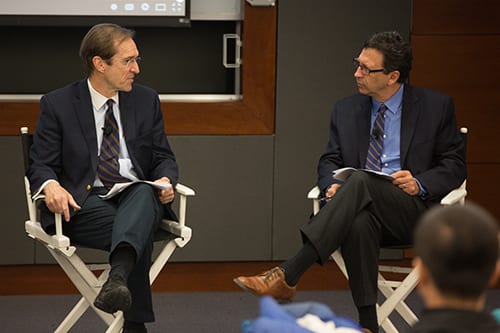
Note: This entry was originally posted on ipdgc.gwu.edu as an event recap.
David Ensor, director of the Voice of America, believes America’s voice is a “far more” effective weapon in foreign policy than most hard power tools, and that most Americans don’t realize the value it has in furthering US policy abroad.
He said this and more at Tuesday’s event, “America’s Voice: U.S. International Media in the Age of Putin, ISIS, and Ebola“, held at the School of Media and Public Affairs. In front of an audience of nearly 100 students, faculty, and professionals, Ensor shared his trajectory in becoming the director of VOA after 30 years as a journalist covering national security and a variety of other topics. He made the case for why VOA matters in today’s “crowded” global media market, despite having its roots in the U.S. government as a tool of public diplomacy.
“What VOA does is honest reporting and we do that because it’s the law of the land,” Ensor said. “There is room on the VOA platform for objective journalism and editorials supporting U.S. policy.”
After sharing two videos that demonstrated the VOA’s breadth of international news coverage in multiple languages, Ensor sat with Frank Sesno, director of the School of Media and Public Affairs, and discussed in an interview format the challenges VOA has faced in recent times, such as budget changes, the Russian crackdown on international media outlets, and the value of studying journalism despite declining job opportunities for recent graduates.
“If given a bigger budget right now, I would spend that on improving our news services in Russian, then Kurdish and Turkish, and then Mandarin,” Ensor said. In regards to Russia’s ban on VOA in the country, Ensor said he would reach out to private companies and set up alternate news outlets in the former Soviet space to help bring alternative voices to the country.
“There’s a reason some governments around the world try so hard to block alternative voices. It’s a powerful tool than most realize,” Ensor said.
Following the interview, Ensor took questions from the audience, which varied from the protection of journalists in dangerous countries and efforts by the U.S. in competing with terrorist communication networks.
“Yes, there a lot more voices out there,” Ensor said in his closing remarks. “But we offer a certain kind of credibility that cuts through the cacophony.”

